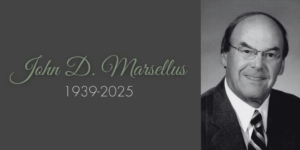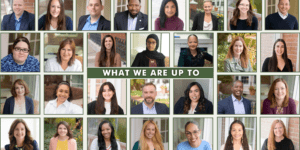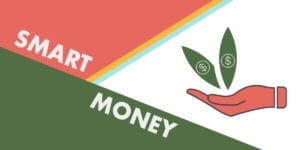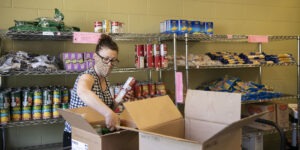
Increasing Access to Economic Opportunities and Community Resources
PICTURED ABOVE: Carrie Valenzuela stands next to a vintage letterpress in her studio
Carrie Valenzuela’s life is busy. As a single parent of a child with special needs, and an entrepreneur, artist and business owner, Valenzuela’s schedule is packed with appointments and commitments. Managing her packed schedule, she said, would be a nightmare without reliable transportation.
“It’s major,” she said. “Can you imagine having a child and having to take your kid to school and then get groceries and then go pick up your kid? How are you going to do that on a bus?”
Never mind making it to appointments — doctors, banks, teacher conferences, professionals like lawyers or accountants — if you must rely on a bus, whose schedule may very well not meet your needs. Then there’s the frustration of waiting outside in Syracuse’s unpredictable and sometimes extreme weather.
For some of her neighbors and colleagues, the lack of cars and driver’s licenses limits educational and employment opportunities. “It’s such a hardship,” said Valenzuela, a Near Westside resident who runs Amaranth Press & Bindery and Salt City Book Arts.
To address that need, we provided $30,000 from our Venture Fund to support the Center for Justice Innovation’s Driving Toward Equity: Increasing Access to Drivers Licenses for Latino Families project. The grant supported costs associated with drivers’ permits, licensing fees and driving courses for Latino families.
This project will increase access to economic opportunities and community resources and reduce language-related barriers by partnering with Branch’s Driving School. It will help individuals and families in Latino households acquire a driver’s license without financial barriers and strengthen community resources and partnerships to improve transportation equity.
The Driving Toward Equity project was chosen during our 2023 Participatory Grantmaking project, launched to address inequity within historically marginalized communities. Valenzuela was among the Latino cohort. Although she initially proposed a different project — a business incubator to support fledgling business owners — she stands behind Driving Toward Equity for its practical approach to a common barrier in her community. “Having a license and reliable transportation is life changing,” she said.
Five groups — including Asian, Indigenous (Onondaga Nation), LGBTQIA+ and people with disabilities — first heard a data presentation that highlighted some of the highest needs each group self-reported. Participants shared their lived experience and identified pressing needs and issues that their respective community faces.
Each group eventually chose, via ballot or group consensus, a project that addresses a community need. The Latino group selected Driving for Equity with 78% of the vote.
Their reasons reflect situations Valenzuela has seen. Many in the Latino community, for example, come to the United States without a driver’s license. In Syracuse it is very challenging to navigate and access resources and job opportunities without a driver’s license or car. And in some households, just one driver helps the entire family. Participants saw Driving for Equity as an immediate, cross-generational process that helps to build equity and access for Latino families.
Valenzuela hopes to see more Latino-owned businesses popping up locally with the increased access to driver licenses, crediting hers as playing a crucial role in the success of her two businesses. She recounted that she was pleased to participate in the democratic Participatory Grantmaking process with others from the community to help get the project off the ground.
Everybody got a chance to talk, Valenzuela said. “It was not just the people in the boardroom. We have this whole community that has been historically marginalized. Diversity in business ownership and positions of financial prosperity has been lacking. It was great to see all the people with all the common goals. People care. They really do.”








